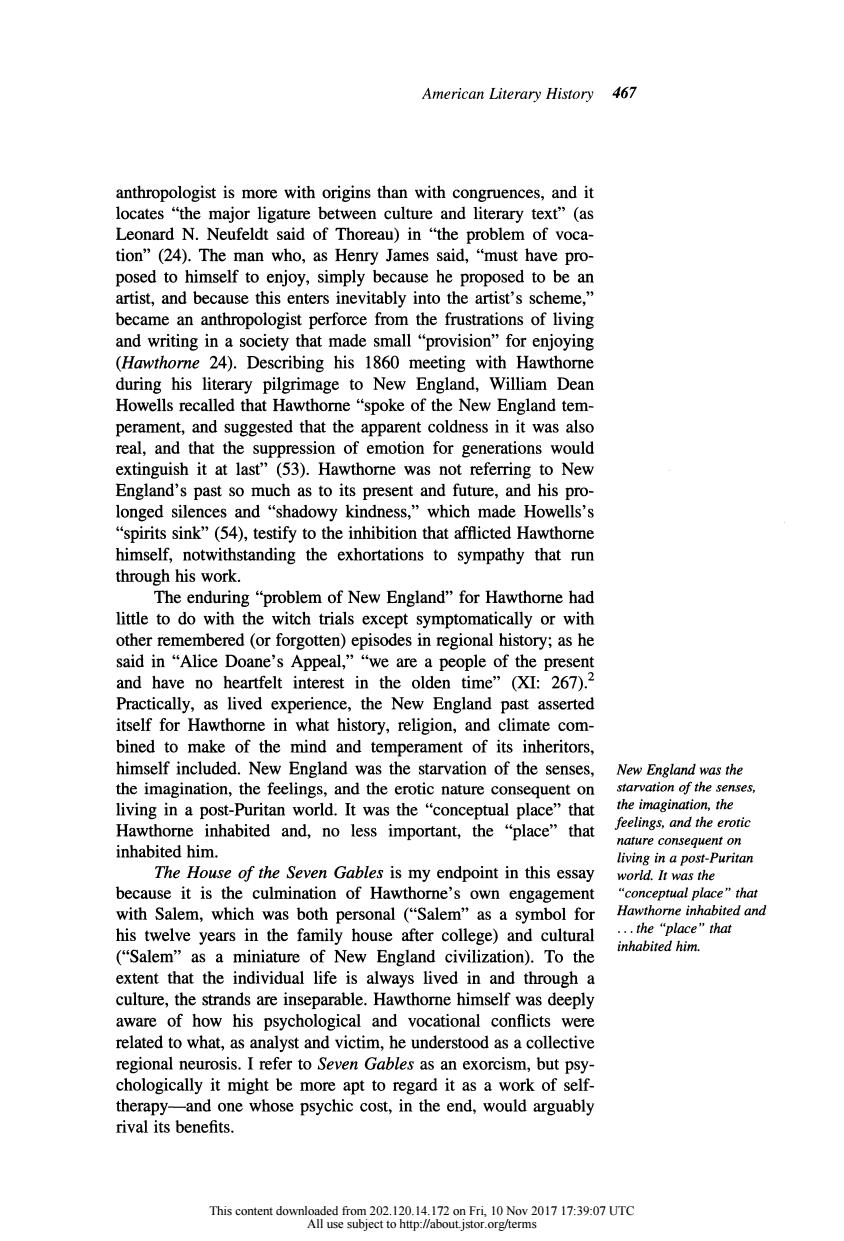正在加载图片...

American Literary History 467 anthropologist is more with origins than with congruences,and it locates "the major ligature between culture and literary text"(as Leonard N.Neufeldt said of Thoreau)in "the problem of voca- tion"(24).The man who,as Henry James said,"must have pro- posed to himself to enjoy,simply because he proposed to be an artist,and because this enters inevitably into the artist's scheme," became an anthropologist perforce from the frustrations of living and writing in a society that made small "provision"for enjoying (Hawthorne 24).Describing his 1860 meeting with Hawthorne during his literary pilgrimage to New England,William Dean Howells recalled that Hawthorne "spoke of the New England tem- perament,and suggested that the apparent coldness in it was also real,and that the suppression of emotion for generations would extinguish it at last"(53).Hawthorne was not referring to New England's past so much as to its present and future,and his pro- longed silences and "shadowy kindness,"which made Howells's "spirits sink"(54),testify to the inhibition that afflicted Hawthorne himself,notwithstanding the exhortations to sympathy that run through his work. The enduring "problem of New England"for Hawthorne had little to do with the witch trials except symptomatically or with other remembered (or forgotten)episodes in regional history;as he said in“Alice Doane's Appeal,”“we are a people of the present and have no heartfelt interest in the olden time"(XI:267).2 Practically,as lived experience,the New England past asserted itself for Hawthorne in what history,religion,and climate com- bined to make of the mind and temperament of its inheritors, himself included.New England was the starvation of the senses, New England was the the imagination,the feelings,and the erotic nature consequent on starvation of the senses, living in a post-Puritan world.It was the "conceptual place"that the imagination,the Hawthorne inhabited and,no less important,the "place"that feelings,and the erotic nature consequent on inhabited him. living in a post-Puritan The House of the Seven Gables is my endpoint in this essay world.It was the because it is the culmination of Hawthorne's own engagement “conceptual place”that with Salem,which was both personal ("Salem"as a symbol for Hawthorne inhabited and his twelve years in the family house after college)and cultural ..the“place”that inhabited him. ("Salem"as a miniature of New England civilization).To the extent that the individual life is always lived in and through a culture,the strands are inseparable.Hawthorne himself was deeply aware of how his psychological and vocational conflicts were related to what,as analyst and victim,he understood as a collective regional neurosis.I refer to Seven Gables as an exorcism,but psy- chologically it might be more apt to regard it as a work of self- therapy-and one whose psychic cost,in the end,would arguably rival its benefits. This content downloaded from 202.120.14.172 on Fri,10 Nov 2017 17:39:07 UTC All use subject to http://about.jstor.org/termsAmerican Literary History 467 anthropologist is more with origins than with congruences, and it locates "the major ligature between culture and literary text" (as Leonard N. Neufeldt said of Thoreau) in "the problem of voca tion" (24). The man who, as Henry James said, "must have pro posed to himself to enjoy, simply because he proposed to be an artist, and because this enters inevitably into the artist's scheme," became an anthropologist perforce from the frustrations of living and writing in a society that made small "provision" for enjoying (Hawthorne 24). Describing his 1860 meeting with Hawthorne during his literary pilgrimage to New England, William Dean Howells recalled that Hawthorne "spoke of the New England tem perament, and suggested that the apparent coldness in it was also real, and that the suppression of emotion for generations would extinguish it at last" (53). Hawthorne was not referring to New England's past so much as to its present and future, and his pro longed silences and "shadowy kindness," which made Howells's "spirits sink" (54), testify to the inhibition that afflicted Hawthorne himself, notwithstanding the exhortations to sympathy that run through his work. The enduring "problem of New England" for Hawthorne had little to do with the witch trials except symptomatically or with other remembered (or forgotten) episodes in regional history; as he said in "Alice Doane's Appeal," "we are a people of the present and have no heartfelt interest in the olden time" (XI: 267).2 Practically, as lived experience, the New England past asserted itself for Hawthorne in what history, religion, and climate com bined to make of the mind and temperament of its inheritors, himself included. New England was the starvation of the senses, the imagination, the feelings, and the erotic nature consequent on living in a post-Puritan world. It was the "conceptual place" that Hawthorne inhabited and, no less important, the "place" that inhabited him. The House of the Seven Gables is my endpoint in this essay because it is the culmination of Hawthorne's own engagement with Salem, which was both personal ("Salem" as a symbol for his twelve years in the family house after college) and cultural ("Salem" as a miniature of New England civilization). To the extent that the individual life is always lived in and through a culture, the strands are inseparable. Hawthorne himself was deeply aware of how his psychological and vocational conflicts were related to what, as analyst and victim, he understood as a collective regional neurosis. I refer to Seven Gables as an exorcism, but psy chologically it might be more apt to regard it as a work of self therapy?and one whose psychic cost, in the end, would arguably rival its benefits. New England was the starvation of the senses, the imagination, the feelings, and the erotic nature consequent on living in a post-Puritan world. It was the "conceptual place" that Hawthorne inhabited and ...the "place" that inhabited him. This content downloaded from 202.120.14.172 on Fri, 10 Nov 2017 17:39:07 UTC All use subject to http://about.jstor.org/terms